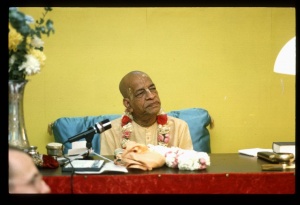SB 4.13.43: Difference between revisions
m (1 revision(s)) |
(Vanibot #0018 edit: make synonym terms in Sanskrit italic in SB - Vanisource) |
||
| Line 1: | Line 1: | ||
{{info | {{info | ||
|speaker=King | |speaker=King Aṅga | ||
|listener=King | |listener=King Aṅga thinking to himself | ||
}} | }} | ||
[[Category:Srimad-Bhagavatam - Canto 04 Chapter 13]] | |||
[[Category:Bhagavatam Verses Spoken by Anga Maharaja - Vanisource|041343]] | |||
<div style="float:left">'''[[Srimad-Bhagavatam]] - [[SB 4|Fourth Canto]] - [[SB 4.13: Description of the Descendants of Dhruva Maharaja|Chapter 13: Description of the Descendants of Dhruva Mahārāja]]'''</div> | |||
<div style="float:right">[[File:Go-previous.png|link=SB 4.13.42]] '''[[SB 4.13.42]] - [[SB 4.13.44]]''' [[File:Go-next.png|link=SB 4.13.44]]</div> | |||
{{RandomImage}} | |||
==== TEXT 43 ==== | ==== TEXT 43 ==== | ||
<div | <div class="verse"> | ||
prāyeṇābhyarcito devo | :prāyeṇābhyarcito devo | ||
ye 'prajā gṛha-medhinaḥ | :ye 'prajā gṛha-medhinaḥ | ||
kad-apatya-bhṛtaṁ duḥkhaṁ | :kad-apatya-bhṛtaṁ duḥkhaṁ | ||
ye na vindanti durbharam | :ye na vindanti durbharam | ||
</div> | </div> | ||
| Line 16: | Line 22: | ||
==== SYNONYMS ==== | ==== SYNONYMS ==== | ||
<div | <div class="synonyms"> | ||
''prāyeṇa''—probably; ''abhyarcitaḥ''—was worshiped; ''devaḥ''—the Lord; ''ye''—they who; ''aprajāḥ''—without a son; ''gṛha-medhinaḥ''—persons living at home; ''kad-apatya''—by a bad son; ''bhṛtam''—caused; ''duḥkham''—unhappiness; ''ye''—they who; ''na''—not; ''vindanti''—suffer; ''durbharam''—unbearable. | |||
</div> | </div> | ||
| Line 23: | Line 29: | ||
==== TRANSLATION ==== | ==== TRANSLATION ==== | ||
<div | <div class="translation"> | ||
The King thought to himself: Persons who have no son are certainly fortunate. They must have worshiped the Lord in their previous lives so that they would not have to suffer the unbearable unhappiness caused by a bad son. | The King thought to himself: Persons who have no son are certainly fortunate. They must have worshiped the Lord in their previous lives so that they would not have to suffer the unbearable unhappiness caused by a bad son. | ||
</div> | </div> | ||
__NOTOC__ | |||
<div style="float:right; clear:both;">[[File:Go-previous.png|link=SB 4.13.42]] '''[[SB 4.13.42]] - [[SB 4.13.44]]''' [[File:Go-next.png|link=SB 4.13.44]]</div> | |||
__NOTOC__ | |||
__NOEDITSECTION__ | |||
Revision as of 22:05, 30 November 2017

His Divine Grace
A.C. Bhaktivedanta Swami Prabhupada
A.C. Bhaktivedanta Swami Prabhupada
TEXT 43
- prāyeṇābhyarcito devo
- ye 'prajā gṛha-medhinaḥ
- kad-apatya-bhṛtaṁ duḥkhaṁ
- ye na vindanti durbharam
SYNONYMS
prāyeṇa—probably; abhyarcitaḥ—was worshiped; devaḥ—the Lord; ye—they who; aprajāḥ—without a son; gṛha-medhinaḥ—persons living at home; kad-apatya—by a bad son; bhṛtam—caused; duḥkham—unhappiness; ye—they who; na—not; vindanti—suffer; durbharam—unbearable.
TRANSLATION
The King thought to himself: Persons who have no son are certainly fortunate. They must have worshiped the Lord in their previous lives so that they would not have to suffer the unbearable unhappiness caused by a bad son.